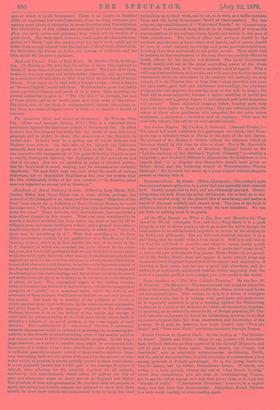Handbook of Rural Sanitary Science. Edited by Lory Marsh, M.D.
(Smith, Elder, and Co.)—There was a time, within, perhaps, the memory of the youngest of us, when, had the average " Guardian of the Poor" been asked for a definition of Rural Sanitary Science, he would have answered, " The science of minding your own business and keeping down the rates." Time, however, and circumstances have produced a marvellous change in this respect. What was once considered to be merely a doctor's question, has been taken up, more or leas, by all in- telligent men, and many intelligent women, and a general disposition is manifesting itself throughout the community to admit that, " after all, there may be something in it.' What that something is Dr. Lory Marsh proposes to explain, by the publication of a Handbook of Rural Sanitary Science, which is, in fact, mainly the text of an essay by Mr. C. F. Gardner, to which was awarded the prize offered by the editor last year, and it is to this gentleman that we may fairly attribute the praise which the work justly deserves. After some good practical and practicable suggestions as to the site, erection, and general arrangements of dwelling- houses of all classes in rural districts, we arrive at the important subject of the disposal of the excreta of the inhabitants. The relati ve advantages and disadvantages of the water-carriage and dry systems are fairly discussed, and useful hints are given as to details to be attended to in the adoption of either, or both. The economical aspect of the various schemes which the country has before it is touched upon, without the exaggerated prospects of "profit," in a monetary sense, which the authors and advocates of those schemes would have us believe are not only possible, but certain. This leads on to mention of the pollution of rivers, on which question great light is thrown by the common-sense arguments, and plain, homely, yet forcible language employed in its discussion. Perhaps, however, it is on the subject of the supply and storage of water that the practical utility of the book most clearly shows itself, in affording a solution of the great problem of the water supply of rural districts. The establishment of " water-shed " districts is advocated, whereby the expense would bo reduced to an average by no means so for- midable to the already overburdened local rates of the smaller parishes and unions as many of their inhabitants might imagine. In this way, a large reservoir, or a series of smaller ones, might be constructed near the source of a stream, whence pure, unpolluted water might be stored, in sufficient quantity to supply several of these smaller districts. Some very interesting facts are also given with regard to the amount of rain- water which, at present, is almost entirely wasted in these rural places. It is not generally known that 1-74th part of the average 32 Moires of rainfall, after allowing for the quantity required for all animals, machinery, and manufactures, would afford 25 gallons per day of pure and wholesome water to every person in England and Wales. The principle of local self-government Mr. Gardner does not propose to upset, but strong and forcible reasons are adduced to show that there should be some more central and independent body, to keep the local
authorities up to their work, and to act, as it were, as a buffer between them and the Local Government Board at head-quarters. For this purpose, the establishment of " Water-shed Boards" or " Conservancy authorities" is advocated, these Boards to be composed of responsible representatives of the various county boards and unions in the area of their jurisdiction. The medical officer and surveyor should be the servants and advisers of these water-shed boards, and of course, should be men of sound sanitary knowledge and great practical experience, devoting their time exclusively to the public service. They might well be assisted by the employment of the local Poor-law medical officers as health officers for the smaller sub-districts. The Local Government Board should still act as the great controlling power of the whole organisation, and form, as it were, a sanitary court of appeal. With a well-organised machinery such as this, and with some few farther sanitary enactments which the necessities of the country will certainly ere long compel, it is no Utopian idea to hope that " when provided with pure air, pure water, good food, and wholesome surroundings, the physique of the people will improve, the average term of life will bo longer, life itself will be more enjoyable, because a higher condition of health has been attained, and a greater degree of contentment and quiet happiness will prevail." Three additional chapters follow, bearing upon very much the same topics as those preceding ; they are extracted from the essays of three other gentlemen who competed for the prize before mentioned, a physician, a barrister, and an engineer. They may be read with interest, but call for no very special remark.






























 Previous page
Previous page